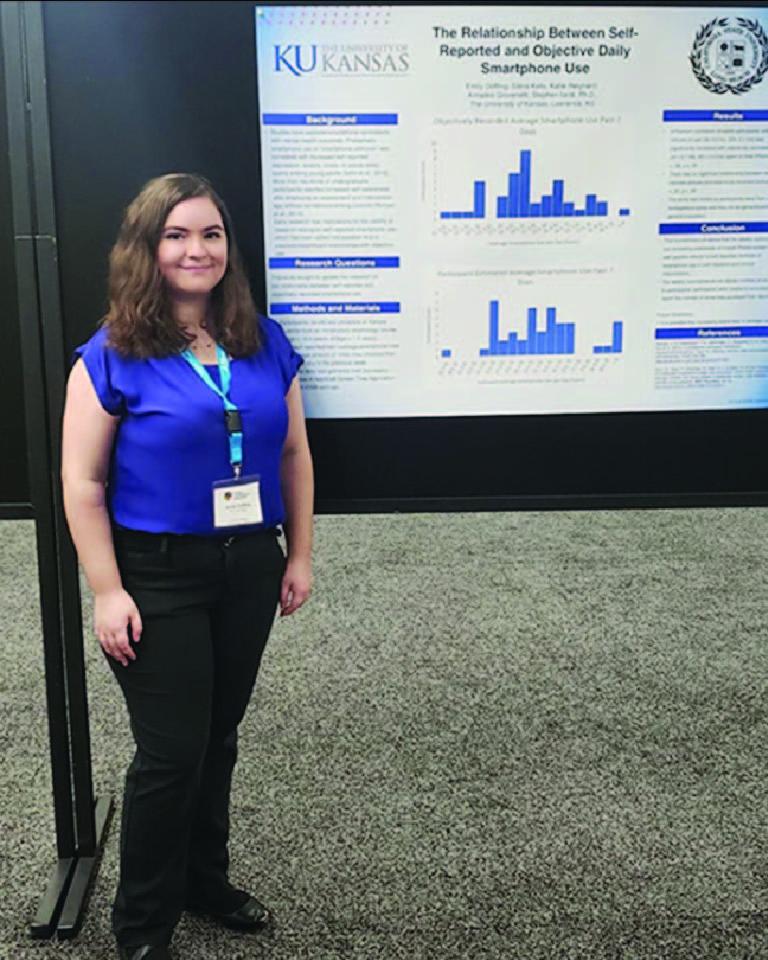Emily Doffing

October 2022 Alumni Spotlight
KU Major: Psychology
Graduation Year: 2021
Current Occupation: Master's Student in Psychological Research
List the faculty member, staff, graduate student, or postdoc who mentored your research or creative project: Dr. Kerr, Dr. Birdnow, and Dr. Lemma
Questions:
Q: What did your research or creative project look like on a day-to-day basis? What did you spend most of your time doing?
A: At CLEOS
- Wrote a literature review for original research, obtained IRB approval, and secured full funding. ●
- Designed an independent project. It examines adolescent predicted response plans, feelings, and passive versus active variability.
- Conducting peer-reviewed surveys and confidential interviews of university, high school, and middle school students.
- Observed and helped applied research services’ transition to online measures for creative and gifted adolescents. This includes career and personality assessment interpretations, group activities, counseling, and EEG brain flower images.
- Contributed to facilitating group discussion and neuroscience activities.
- Documented and updated contact information of seven cohorts of clients.
Cofrin Logan Center for Addiction Research and Treatment
- Assisted in projects investigating decision-making processes associated with health outcomes and delayed discounting.
- Attended two weekly meetings discussing theoretical articles and general research.
- Conducted a literature review and co-prepared The Three-Person Ultimatum Game study’s proposal.
At TLC
- Developed collaborative surveys for quantitative and mixed method studies, coded and de-identified data, facilitated and completed data analyses, conducted literature reviews, aided IRB submissions, ran participants, and produced a research presentation and abstract per semester.
- Assessed participants for suicide risk and directed them to appropriate resources after face-to-face counseling.
- Cultivated a successful research lab by mentoring RAs in their college career, revising others’ work, and guiding new RAs.
Q: What do you think was the most important thing you learned while doing undergraduate research?
A: I learned to always take opportunities when they come. Take one hour of the week to apply for something. You do belong in your academic and leadership positions. Be part of a community and know the people in your life that can re-energize and hype you up. My undergraduate research community was the McNair Scholars Program.
Q: What advice do you have for undergraduates who might be interested in doing research or creative scholarship?
A: Believe in yourself. That you’ll finish that paper, get that scholarship, connect with a professor. When you are struggling with your self-confidence, remember your success and resilience to problems. Create a writing group. There are a lot of psychological benefits to working with other people that are also working. Every day you should write about something that will persist your academic success and professional development. You can create a calendar where you check off if you wrote for at least a minute, something you are grateful for, and what you worked on. You’ll be proud of your progress. Foster your intellectual curiosity. Keep a list of research ideas, questions, and curiosities. Each entry can be added at any time, just from the observations of life.
Q: Do you use any of the skills or perspectives gained doing research in your current occupation? How so?
A: I built foundational research design, data collection, critical thinking, and writing skills. I learned about transformative research with a social justice approach. It challenges assumptions, examines the big picture, intertwines with social-political activism, and maps problems with opportunities. I am conducting a Participatory Action Research study to research with, instead of research on, a marginalized community of disabled college students.
Q: Many undergraduate researchers are making decisions about what to do after they graduate from KU. Having been in those shoes, what do you know now that you wish you’d known then? Do you have any advice?
A: My time at KU gave me the freedom to explore a lot of different career paths and psychology subfields. My mentors, professors, fellow TRIO students, and classmates encouraged me to pursue opportunities. Everyone’s plans in college change at least once. Connect with alumni and the KU career center because you deserve resources to take your next steps. Don’t undersell yourself, your expertise, and your experiences to others and to yourself. While in school, if possible, I would recommend working in one internship or career-related position.